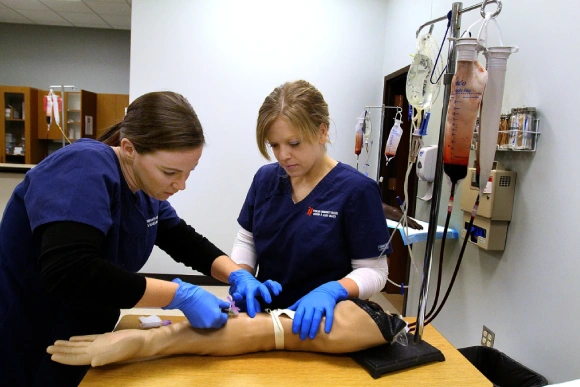What Does a Medical Assistant Do?
Medical assistants do different tasks depending on where they work. Here are some everyday things they do:
Office Work: MAs handle administrative duties. They set appointments, organize medical records, manage bills, and get patients the right help.
Medical Tasks: MAs assist physicians and nurses with clinical tasks. They check vital signs, prepare patients for check-ups, collect samples for tests, give medicines, and do simple lab tests.
Taking Care of Patients: MAs provide direct patient care. They explain treatment plans and how to take care of themselves.
Keeping Equipment Clean: MAs make sure medical tools are clean and work right. They might also help in minor surgical procedures.
Writing Things Down: MAs write patient information, medical history, and treatment plans in electronic health records (EHRs).
What medical assistants can do might differ in each state, so it’s essential to know the rules where you want to work.
Where Do Medical Assistants Work the Most?
Medical assistants work in various healthcare settings, and here’s what they do:
Doctor’s Offices: MAs help doctors in their private offices.
Hospitals: They assist in different parts of hospitals, like the emergency room and clinics.
Clinics: In outpatient clinics, they support patients who don’t need to stay in the hospital.
Urgent Care Centers: They provide quick care for non-serious health issues.
Specialized Clinics: MAs work in dermatology, cardiology, or orthopedics.
Nursing Homes: Some work in homes for the elderly, caring for older people.
Medical Laboratories: They do basic tests and help collect and handle samples.
The need for medical assistants is increasing because there are more older people. Also, it’s getting easier to get healthcare, and medical technology is improving.
Types of Medical Assistant Training Programs
To become a medical assistant, you must complete a training program. There are different types of programs available, including:
- Diploma or Certificate Programs
-
- These programs typically take 9-12 months to complete.
- They provide a comprehensive curriculum that covers both administrative and clinical skills.
- Vocational schools, community colleges, and online institutions provide diploma or certificate programs.
- Associate Degree Programs
-
- These programs generally take 1-2 years to complete.
- These programs give you more learning and also include regular school classes along with medical assistant stuff.
- Associate degree programs are often offered at community colleges and technical schools.
- Online Medical Assistant Programs
- Online programs are great because you can do your schoolwork when it suits you best.
- These programs cover the same material as traditional on-campus programs.
- Online medical assistant programs are offered by accredited institutions such as CCI Training Center.
Skills and Qualifications of a Medical Assistant
Specific skills and qualifications are required to excel as a medical assistant. These include:
- Strong Communication Skills: Medical assistants need to talk well with patients, doctors, and the office people. They also need to be good at listening and explaining medical things clearly to people.
- Attention to Detail: Medical assistants have to pay close attention to details, like writing things down correctly and handling medical tools and samples carefully.
- Organizational Skills: The ability to multitask, focus on tasks, and manage time efficiently is crucial in a fast-paced healthcare environment.
- Technical Skills: Proficiency in using electronic health record systems, medical billing software, and essential office equipment is necessary for medical assistants.
- Compassion and Empathy: Medical assistants often work with patients experiencing physical or emotional distress. Compassion and empathy are essential in providing quality patient care.
Recommended for you
-
Medical Assistant Program
Take our accelerated Medical Assistant with Clinical Labs program at our Arlington campus and start a new career in as little as 8 months!
Radiology Technician Training
Take our accelerated Radiology Technician Training program at our Arlington campus and start a new career in as little as 8 months!
Medical Billing And Coding Specialist Program
Our 100% online accelerated Medical Billing and Coding Specialist Program makes it possible for you to train for a new career in as little as 25 weeks!
Accredited Pharmacy Technician Training Program
Our 100% online accelerated Pharmacy Technician Training program makes it possible for you to train for a new career in as little as 25 weeks!
Medical Assistant Program
Our 100% online fast track Medical Assistant program makes it possible for you to train for a new career in as little as 6 months!
What Is the Highest Level of Medical Assistant?
The top level for a medical assistant is Certified Medical Assistant (CMA). To become a CMA, MAs need to pass an exam from the American Association of Medical Assistants (AAMA). Being a CMA shows that an MA is skilled and dedicated.
To take the CMA exam, you should finish a medical assistant program accredited by the Commission on Accreditation of Allied Health Education Programs (CAAHEP) or the Accrediting Bureau of Health Education Schools (ABHES). You’ll also need to complete an internship or work in a medical place.
Certification is only sometimes needed to work as a medical assistant, but it’s a good idea. It can help you get better jobs and higher pay. In some states, you might have to get certified or registered to work as a medical assistant.</span
Factors that Influence Medical Assistant Job Responsibilities
An important thing to keep in mind is that every workplace is different, and medical assistants may be expected to perform a combination of duties specific to the needs of their medical office. Here are a few examples of how different needs can change the job description:
Size of the Medical Team
In a smaller private practice, a medical assistant may be expected to schedule patient appointments and provide patient care, such as taking weight and height measurements. Meanwhile, a medical office with a large staff, such as a group practice, may separate the roles of patient care and administrative work.
Workplace Structure and Patient Volume
While a small private practice may assign a medical assistant to take X-rays or perform blood draws, a high-volume practice in a hospital may direct their patient to the radiology or diagnostic center within their building. A large hospital will most likely have a billing department, while in private practice, a medical assistant may oversee the processing of billing and insurance claims.
Type of Practice
The specialty or subspecialty of a medical facility affects the expertise and daily duties of its medical assistant. For example, an administrative medical assistant at an urgent care clinic will frequently encounter work-related injuries and worker’s compensation, while administrative medical assistants at a dermatology or other specialty clinic may be required to send and receive referrals.
With campuses in Dallas and Arlington, CCI Training Center offers comprehensive, accelerated career training in Medical Assisting with Nutrition and Weight Management, among other healthcare career options.
What are the Work Hours for Medical Assistants?
Medical assistants work in various healthcare settings, and their work hours can vary depending on the facility’s operating hours and patient demand. Some of the typical work schedule options for medical assistants include:
- Full-time: Typically 40 hours per week, with a set schedule.
- Part-time: Usually less than 40 hours per week, with flexible scheduling options.
- Shift work: Medical assistants may be required to work evenings, weekends, or holidays to ensure round-the-clock patient care.
Education, Experience, and Licensing Requirements of Medical Assistants
While there are no formal education requirements to become a medical assistant, most employers prefer candidates who have completed a training program. Additionally, some states may have specific licensing or certification requirements. Here’s what you need to know:
- Education
-
- Completion of a diploma, certificate, or associate degree program in medical assisting is highly recommended.
- These programs provide the knowledge and skills needed to perform the duties of a medical assistant.
- Experience
-
- Some employers may require prior experience or on-the-job training in a healthcare setting.
- Volunteering or completing an internship can help you gain valuable experience in the field.
- Licensing and Certification
-
- While not always required, obtaining certification as a Certified Medical Assistant (CMA) or Registered Medical Assistant (RMA) can enhance job prospects.
- Certification is typically obtained through a recognized professional organization such as the American Association of Medical Assistants (AAMA) or the American Medical Technologists (AMT).
Final Thoughts
Being a medical assistant can be a fulfilling career if you’re interested in healthcare and enjoy helping patients. With more people needing healthcare, medical assistants are becoming even more critical.
If you’re considering becoming an MA, choose a good training program that suits your needs and goals. Online programs, like those offered by CCI Training Center, give you flexibility and quality education.
When you learn the right skills in an outstanding MA program, you can enter the healthcare field with great confidence. You’ll make a very positive impact on the lives of the patients. So, don’t hesitate to start your exciting journey toward a truly fulfilling career as a medical assistant. You’ll discover so many fantastic opportunities waiting for you. Good luck!
Martin Zandi

Related Articles

























